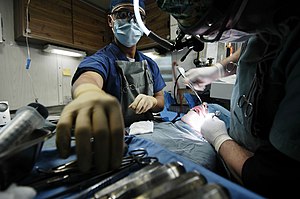Maxillofacial surgery
 |
|
| Occupation | |
|---|---|
| Names | Oral and maxillofacial surgeon |
|
Occupation type
|
Specialty |
|
Activity sectors
|
Dentistry, medicine, surgery |
| Description | |
|
Education required
|
|
Oral and maxillofacial surgery (OMS or OMFS) specializes in treating many diseases, injuries and defects in the head, neck, face, jaws and the hard and soft tissues of the oral (mouth) and maxillofacial (jaws and face) region. It is an internationally recognized surgical specialty. In some countries around the world, including the United States, India, Canada, Brazil, Australia, Sweden and Israel, it is a recognized specialty of dentistry; in others, such as the UK and most of Europe, it is recognized as both a specialty of medicine and dentistry, and a dual degree in medicine and dentistry is compulsory.
In several countries oral and maxillofacial surgery is a speciality recognized by a professional association, as is the case with the Dental Council of India, American Dental Association, Royal College of Surgeons of England, Royal College of Surgeons of Edinburgh, Royal College of Dentists of Canada, Royal Australasian College of Dental Surgeons and Brazilian Federal Council of Odontology (CFO).
In other countries oral and maxillofacial surgery as a specialty exists but under different forms, as the work is sometimes performed by a single or dual qualified specialist depending on each country's regulations and training opportunities available.
An oral and maxillofacial surgeon is a regional specialist surgeon treating the entire craniomaxillofacial complex: anatomical area of the mouth, jaws, face, and skull, as well as associated structures.
Depending upon the jurisdiction, maxillofacial surgeons may require training in dentistry, surgery, and general medicine; training and qualification in medicine may be undertaken optionally even if not required.
...
Wikipedia
